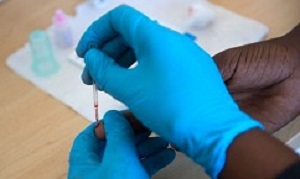 University of Cape Town (UCT) scientists have offered the first hope of addressing the risk of tuberculosis-associated immune reconstitution inflammatory syndrome (TB-IRIS), which is common among HIV-positive patients also taking anti-tuberculosis medication. To date, there has been no management strategy for preventing this complication. But now the findings provide clinicians with a strategy for reducing this risk, Professor Graeme Meintjes, principal investigator on the so-called PredART trial, said of the results.
University of Cape Town (UCT) scientists have offered the first hope of addressing the risk of tuberculosis-associated immune reconstitution inflammatory syndrome (TB-IRIS), which is common among HIV-positive patients also taking anti-tuberculosis medication. To date, there has been no management strategy for preventing this complication. But now the findings provide clinicians with a strategy for reducing this risk, Professor Graeme Meintjes, principal investigator on the so-called PredART trial, said of the results.
The Wellcome Centre for Infectious Diseases Research in Africa (CIDRI-Africa), based at UCT, conducted the trial at Khayelitsha’s Site B HIV-TB clinic. The scientists worked in collaboration with colleagues at the Institute of Tropical Medicine (ITM) in Antwerp, Belgium.
According to their analysis, a four-week course of moderate-dose immune suppressant prednisone reduces by 30% the risk of TB-IRIS in HIV-positive patients taking anti-TB medication, who are at risk for developing the condition.
Meintjes explained that it is critical to start patients with HIV, TB and very low CD4 counts on antiretrovirals within the first two weeks of treatment for TB – “because it saves lives”. “But this also comes at the cost of a two-fold higher risk of them developing the inflammatory complication TB-IRIS,” he said.
TB-IRIS is characterised by severe inflammation which occurs shortly after patients on TB treatment also start taking antiretroviral therapy (ART). It’s a serious risk that results in a quarter of affected patients being hospitalised.
The PredART researchers investigated whether administering moderate-dose prednisone, which modulates the immune system and treats inflammation, can safely reduce the incidence of paradoxical TB-associated IRIS in patients at high risk for the syndrome.
The trial involved 240 HIV-positive patients with very low CD4 counts who were initiating ART, and who had started TB treatment within the 30 days prior to enrolment.
The CD4 count offers a snapshot of the health of the immune system, with CD4 cells the white blood cells that fight infection. The count usually increases when the HI virus is controlled with ART.
“The researchers found that patients who received prednisone during the first four weeks of ART were less likely to develop TB-IRIS than those who received the placebo,” Meintjes said.
A total of 56 patients in the placebo group were diagnosed with TB-associated IRIS, against 39 in the prednisone group, indicating a risk reduction of 30%. Moderate-dose prednisone was also well tolerated by the patients, and the researchers found no evidence of an increased risk of severe infections or cancers with this treatment.
“This is the first trial to show that TB-IRIS can be prevented in these patients, and represents an important contribution to the body of knowledge on management of HIV-TB co-infection,” said Meintjes.
Abstract
Background: Early initiation of antiretroviral therapy (ART) in human immunodeficiency virus (HIV)–infected patients who have tuberculosis reduces mortality among patients with low CD4 counts, but it increases the risk of paradoxical tuberculosis-associated immune reconstitution inflammatory syndrome (IRIS).
Methods: We conducted this randomized, double-blind, placebo-controlled trial to assess whether prophylactic prednisone can safely reduce the incidence of paradoxical tuberculosis-associated IRIS in patients at high risk for the syndrome. We enrolled HIV-infected patients who were initiating ART (and had not previously received ART), had started tuberculosis treatment within 30 days before initiating ART, and had a CD4 count of 100 cells or fewer per microliter. Patients received either prednisone (at a dose of 40 mg per day for 14 days, then 20 mg per day for 14 days) or placebo. The primary end point was the development of tuberculosis-associated IRIS within 12 weeks after initiating ART, as adjudicated by an independent committee.
Results: Among the 240 patients who were enrolled, the median age was 36 (interquartile range, 30 to 42), 60% were men, and 73% had microbiologically confirmed tuberculosis; the median CD4 count was 49 cells per microliter (interquartile range, 24 to 86), and the median HIV type 1 RNA viral load was 5.5 log10 copies per milliliter (interquartile range, 5.2 to 5.9). A total of 120 patients were assigned to each group, and 18 patients were lost to follow-up or withdrew. Tuberculosis-associated IRIS was diagnosed in 39 patients (32.5%) in the prednisone group and in 56 (46.7%) in the placebo group (relative risk, 0.70; 95% confidence interval [CI], 0.51 to 0.96; P=0.03). Open-label glucocorticoids were prescribed to treat tuberculosis-associated IRIS in 16 patients (13.3%) in the prednisone group and in 34 (28.3%) in the placebo group (relative risk, 0.47; 95% CI, 0.27 to 0.81). There were five deaths in the prednisone group and four in the placebo group (P=1.00). Severe infections (acquired immunodeficiency syndrome–defining illnesses or invasive bacterial infections) occurred in 11 patients in the prednisone group and in 18 patients in the placebo group (P=0.23). One case of Kaposi’s sarcoma occurred in the placebo group.
Conclusions: Prednisone treatment during the first 4 weeks after the initiation of ART for HIV infection resulted in a lower incidence of tuberculosis-associated IRIS than placebo, without evidence of an increased risk of severe infections or cancers.
Authors
Graeme Meintjes, Cari Stek, Lisette Blumenthal, Friedrich Thienemann, Charlotte Schutz, Jozefien Buyze, Raffaella Ravinetto, Harry van Loen, Amy Nair, Amanda Jackson, Robert Colebunders, Gary Maartens, Robert J. Wilkinson, Lutgarde Lynen
[link url="https://www.news.uct.ac.za/article/-2018-11-15-infectious-diseases-treatment-breakthrough"]University of Cape Town material[/link]
[link url="https://www.nejm.org/doi/full/10.1056/NEJMoa1800762"]New England Journal of Medicine abstract[/link]
[link url="https://resident360.nejm.org/content_items/preventing-tuberculosis-associated-iris"]NEMJ[/link]
